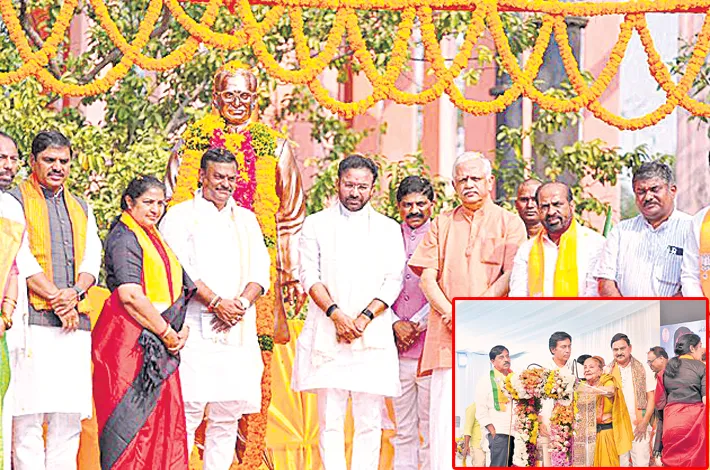Trump tariffs wipe `14L cr off Dalal Street
08-04-2025 12:00:00 AM

Monday mayhem | Indian markets in turmoil; Sensex sinks 2,227 pts - its steepest single-day decline in 10 months
FPJ News Service mumbai
Indian stocks plunged on Monday in the midst of sweeping reciprocal tariffs imposed by President Trump, and widespread fears about a possible global recession. Dalal Street witnessed one of its deepest falls since June 2024 on Monday, with economists and market analysts predicting a long-term capital market turmoil.
Sensex plummeted nearly 2,227 points to settle at 73,138, while Nifty tumbled 743 points to settle at 22,161, recording a fall of over three per cent each, and further dampening the market sentiment and eroding investor-confidence.
Sensex recorded its steepest single-day fall since June 2024. During the day, the Sensex slumped 3,940 points (5.22%) to 71,425. Intra-day, Nifty dropped 1,161 points (5%) to 21,744. Reflecting the increased uncertainty, and drastic fall in share prices, the India Volatility Index shot up by 60%, signaling extreme future volatility.
Blue-chips crash
Escalating global trade war knocked off the value of India’s biggest companies and heightened fears of a crash worse than the Covid-19 pandemic period. In the opening session on Monday, the market capitalisation of BSE-listed companies dropped by more than Rs 14 lakh crore within minutes.
Shares of Tata Motors closed nearly six per cent lower after the company-owned Jaguar Land Rover paused vehicle shipments from its facilities in the UK to the US to work out new trading terms in the wake of changes in the tariff structure.The stock lost 11.61% to Rs 542.55 (its 52-week low) in intraday trade on the BSE.
Shares of the firm finally closed at Rs 579.85, down 5.54%.At the NSE, the stock declined 5.33% to Rs 581.10. Intraday, it tanked 12.72% to hit the 52-week low of Rs 535.75.The company’s market valuation eroded by Rs 12,502crore to Rs 2.13 lakh crore. Shares of Tata Steel tanked 11.56%, National Aluminium Company slumped 11.22%, APL Apollo Tubes lost 10%, SAIL declined 10%, JSW Steel lost 9.92%, and Jindal Stainless dropped 9.91% on the BSE.
Shares of Hindustan Zinc sank 9.83%, Hindalco Industries slumped 8.95%, NMDC tumbled 8.48% and Jindal Steel & Power 8.19%.Larsen & Toubro, HCL Technologies, Adani Ports, Tech Mahindra, Infosys, Tata Consultancy Services, Reliance Industries and Mahindra & Mahindra were the other big losers.
FIIs offload equities worth `9,000 cr
Foreign investors on Monday pulled over Rs 9,000 crore from Indian equities, marking April’s second-largest outflow in 2025. The Nifty lost 5% intraday before partially recovering, weighed by US tariffs, global recession fears, rising US yields, and a weakening rupee. FIIs have sold just over Rs 12,000 crore in late February, the highest in 2025.
Wealth erodes
Dalal Street investors were a poorer lot on Monday as their wealth eroded sharply by Rs 14 lakh crore following a sharp decline in benchmark indices amid a global market meltdown due to recession fears. Mirroring the bearish trend in equities, the market capitalisation of BSE-listed firms declined sharply by Rs 14,09,225.71 crore to Rs 3,89,25,660.75 crore (USD 4.54 trillion) in a single day. At one point during the morning trade, investors' wealth eroded sharply by Rs 20.16 lakh crore.
Metal stocks hit hard
Shares of metal firms were hit hard on Monday after US President Donald Trump's tariff hikes and retaliation from China fanned fears that a full-blown trade war will impact economic growth across the globe.
The stock of National Aluminium Company Ltd tanked 8.18 per cent, Tata Steel slumped 7.73 per cent, JSW Steel tumbled 7.58 per cent, SAIL dropped 7.06 per cent, and Jindal Steel & Power Ltd lost 6.90 per cent on the BSE.
Shares of Vedanta dived 6.90 per cent, Jindal Stainless Ltd declined 6.36 per cent, Hindalco Industries went lower by 6.26 per cent, NMDC (5.75 per cent), Hindustan Zinc (4.89 per cent) and APL Apollo Tubes (4.77 per cent). The BSE metal index dropped 6.22 per cent to 26,680.16.
History (crash)
History of Indian market crash has a few more interesting stories to tell. The first and major shockwave unearthed in 1992, when the Rs 4,000 crore Harshad Mehta scam was exposed. On April 28, 1992, Sensex nosedived 12.7%, resulting in sweeping reforms in the financial system, including the strengthening of regulatory powers. The market was rocked by another manipulation scandal involving a leading stockbroker in 2001 when the dot-com bust hit market.
On March 2, 2001, the Sensex dropped 4.13%. Gujarat earthquake and weak global cues further worsened the bearish sentiment. In 2004 India’s General Election results shocked the markets. The UPA’s sudden victory over the NDA raised concerns about the continuity of economic reforms. In 20028, markets crashedon global financial crisis following the collapse of leading international funds in the US.
On January 21, 2008, the Sensex lost 7.4%, due to fears of a global recession and mass sell-offs by foreign investors. The Sensex continued its downtrend for a few more months. The Covid-19 outbreak had triggered the most severe single-day crash in the history of Indian stock markets. On March 23, 2020, the Sensex crashed 3,935 points (13%) as India announced a nationwide lockdown.








